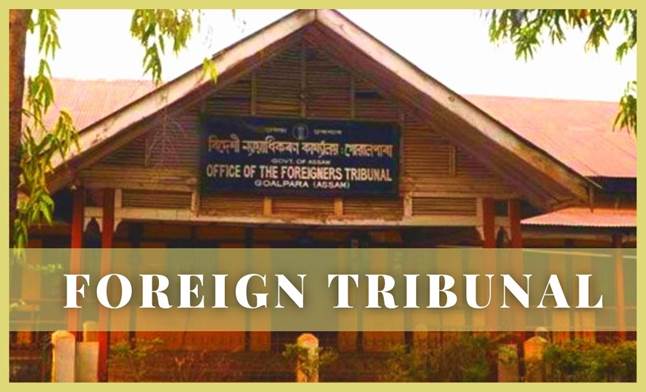Description

Copyright infringement not intended
In News
- The High Court of Guwahati has asked the Union and the Assam state government to collectively decide on the appointment of the staff for 200 additional Foreigners’ Tribunals (FT).
- Assam had as many as 100 Foreigners’ Tribunals (FT) before the publication of the complete draft of the updated National Register of Citizens (NRCs) in 2019 August.
- To hear appeals of the 19.06 lakh people excluded from the published list of citizens. The Union Home Ministry decided to increase the number of FTs in Assam to 1,000 to cope with the expected litigation after rejection slips were issued by the NRC authority.
Foreigners Tribunals
- They are established under the provisions of the Foreigners Act 1946 and Foreigners (Tribunals) Order 1964.
- They are quasi-judicial bodies, their main function is to determine whether a person staying illegally is a “foreigner” or not.
- Only Foreigners’ Tribunals can declare a person as a foreigner.
- Any Person, whose name is not in the final published list of the National Register of Citizens (NRC), can represent their case in Foreigners Tribunals (FT).
- Each Foreigners Tribunal Member is appointed as per the guidelines issued by the government.
Related News
- Recently the Union government introduced a new clause in the Foreigners Order, 1948, that requires foreigners to hold a valid passport or travel documents not just while entering India, but also during their entire stay in the country.
- The Government has explained that these “valid documents” would include “emergency certificate or certificate of identity or such other document” issued by the foreign country concerned.
- Exemption from holding valid travel documents to “persons belonging to minority communities in Afghanistan, Bangladesh and Pakistan, namely, Hindus, Sikhs, Buddhists, Jains, Parsis and Christians who were compelled to seek shelter in India due to religious persecution or fear of religious persecution and entered into India on or before December 31, 2014”.
- The Ministry of Home Affairs said that the exception has nothing to do with the Citizenship Amendment Act (CAA), which grants citizenship to above-mentioned communities from the three countries. The Act, passed in 2019, has not been implemented as its rules are yet to be framed.

Reason behind the amendment
- Sources in the Ministry of Home Affairs (MHA) said several foreigners have been found to be overstaying in India and claiming to have lost their documents.
- “Earlier, the Foreigners Act and Order only talked about holding a valid document while entering India. Although it is understood that one must continue to hold the document while living in India, it has been observed that some people have been violating this condition and so it has been inserted for more clarity”.
- In a genuine case of loss of documents, it is expected the foreigner would report the matter to police and contact his embassy to get temporary documents.
Foreigner registration in India
- Foreigner registration is a mandatory requirement by the Government of India under which all foreign nationals (excluding overseas citizens of India) visiting India on a long term visa (more than 180 days) are required to register themselves with a Registration Officer within 14 days of arriving in India.
- Pakistani nationals visiting India are required to register within 24 hours of arrival regardless of the duration of their stay.
- Foreign children below the age of 16 are exempt from registration requirements.
- Foreign nationals must report in-person to the nearest Registration Officer in their jurisdiction.
- Persons suffering from medical issues may be exempt from appearing in-person for registration.
- Foreign nationals are issued a residential permit at the time of registration. The permit has a validity matching the period of stay specified in the visa.
- In April 2018, the Union Government launched the e-FRRO scheme which allows foreigners to register and avail visa and immigration related services online. Under the new scheme, a foreign citizen is no longer required to appear in-person at an FRRO, unless specifically required to do so.
- Foreigners order 1948
- It provides guidelines to deal with all foreigners.
- It empowered the government to take such steps as are necessary to prevent illegal migrants including the use of force.
- The concept of ‘burden of proof’ lies with the person, and not with the authorities.
- Empowered the government to establish tribunals which would have powers similar to those of a civil court.
- Amendments (2019) to the Foreigners (Tribunals) Order, 1964 empowered even district magistrates in all States and Union Territories to set up tribunals to decide whether a person staying illegally in India is a foreigner or not.
https://epaper.thehindu.com/Home/ShareArticle?OrgId=GAMA4FV55.1&imageview=0
https://t.me/+hJqMV1O0se03Njk9













